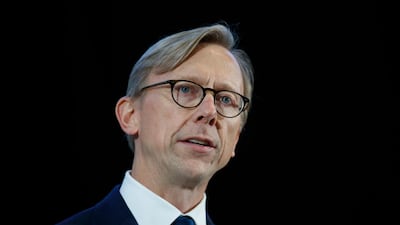The US special representative for Iran, Brian Hook, on Wednesday said he expected the nuclear deal between Iran and world powers to be dismantled as its clauses continued to expire.
“This deal is going to … keep expiring until there's no deal left," Mr Hook told the Aspen Security Forum on Wednesday.
The nuclear deal, known as the Joint Comprehensive Plan of Action, placed limits on Iranian nuclear activity in exchange for sanctions relief.
The administration of President Donald Trump, which took the US out of the agreement signed by Barack Obama in 2015, would like a new deal, Mr Hook said.
“The sunset [clauses] start to expire in about two months," he said. "This deal is going to continue expiring. The missile restrictions expire in 2023."
Mr Hook said any new deal would have to restrict uranium enrichment.
“As long as Iran is allowed to enrich, we will be having this discussion on how close they are,” he said, calling on China and Russia to support the move as they did in 2006.
"We need to restore the UN Security Council standard on no enrichment."
Mr Hook said Iran's hand in the Middle East had weakened since the US killed the leader of the Islamic Revolutionary Guard Corps, Qassem Suleimani, in Baghdad in January.
“He spoke Arabic fluently and was a genius in organising Iran’s proxies," he said. "We see big change since he was taken off the battlefield."
Mr Hook said Iran was “outplaying its weak hand in Iraq” through its proxies.
He said the protests in Iraq were an outright rejection of any Iranian role in the country.
The US is pushing for the UN Security Council to extend its arms embargo on Iran, which is set to expire in October.
"If you listen to the countries in the region, they're all speaking with one voice,” Mr Hook said.
“When the Arabs and Israelis agree on extending the arms embargo on Iran, it is significant and we should take note."
He said that if the embargo were not achieved, snapback sanctions on Iran were “an open question”.
“We haven’t had a vote yet," Mr Hook said. " I don’t give up on diplomacy until I see the vote and hands up in New York."
Russia and China, which have the power of veto in the Security Ciuncil, have voiced objections to renewing the embargo.
Secretary of State Mike Pompeo announced on Wednesday that the US would introduce a Security Council resolution next week to extend the embargo.
Mr Pompeo said the US was “not going to let the Iran arms embargo expire”.


